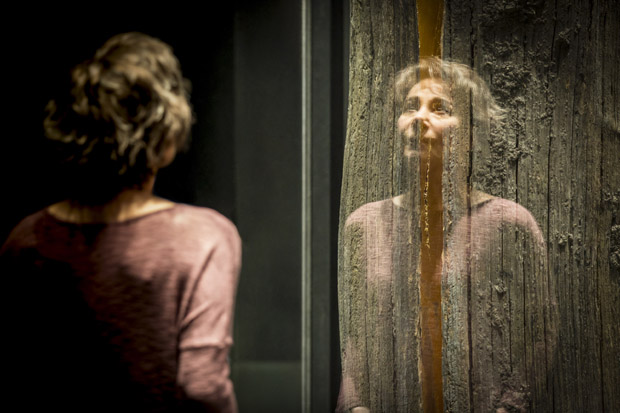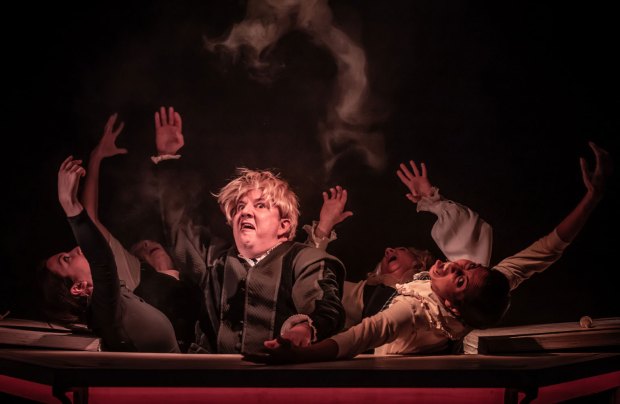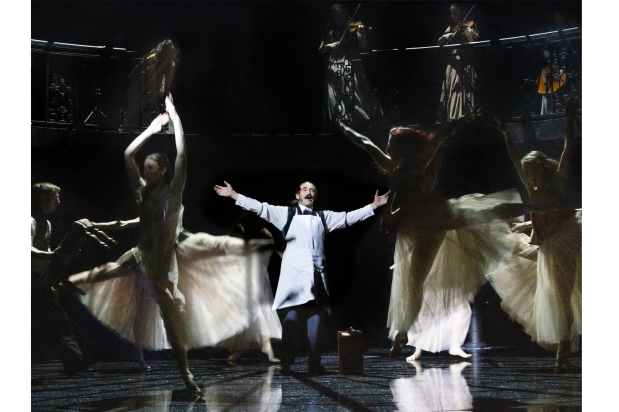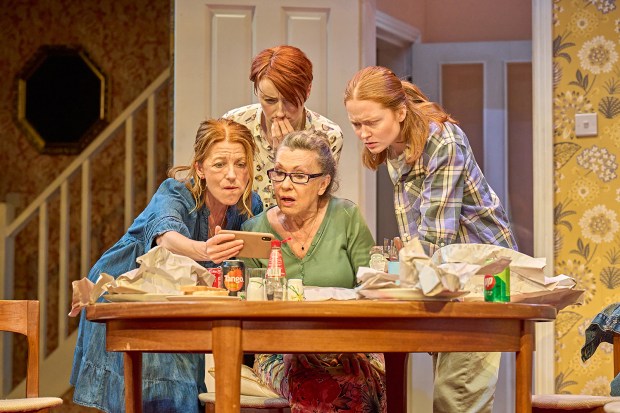T.E. Lawrence is like the gap-year student from hell. He visits a country full of exotic barbarians and after a busy few months rescuing them from their spiritual frailties, and helping them emulate their Western superiors, he returns home and never stops boring on about it. ‘How much I learned from them,’ he gushes, when what he means is, ‘How much they learned from me.’
That’s always been the view of Lawrence’s critics, among them fellow British army officers, who saw him as a reckless, attention-seeking fantasist. Howard Brenton’s new play offers a more charitable portrait of Lawrence as a brilliant, sensitive, rootless genius. The action opens with him newly enlisted as a flunkey in the RAF under the surname ‘Ross’. He visits his pal Bernard Shaw, who is in the process of writing Saint Joan. Shaw grafts elements of Lawrence’s character on to his version of the Maid of Orléans. Cameos shuffle on and off. General Allenby stomps about briefly. Lowell Thomas, an American impresario, pops in for a whinge. Shaw’s neglected wife, Charlotte, conceives a sexless crush on their house guest and Lawrence imagines himself back in the desert wearing billowing robes amid gun-toting fanatics beneath the burning skies.
The play has a linear, explanatory style, more like an illustrated sermon than a drama, because the author belongs to the post-war generation that regarded the theatre as an extension of the state bureaucracy and a useful instrument for teaching proles about difficult stuff like politics, war and foreigners. All the certainties of the hippie decade are on display. It goes like this: men are important; women less important; Americans bad; field marshals very bad; journalists evil; artists good; playwrights marvellous; secretaries nice but thick; posh socialists excellent; Arabs fickle but glamorous; working-class people irrelevant.
The character of Lawrence is almost too sweet and biddable. He’s a cultivated fun-loving prankster who regards life as a series of charming surprises. Was there nothing darker and more mysterious lurking there? When his naked back is exposed, we see livid purple scars inflicted presumably by hired flagellants. But this effect, literally skin-deep, is all we learn of his troubled inner life. The play’s great success is the study of Bernard Shaw as a twinkly white-bearded old rascal who keeps nipping off to the garden shed to add another scene to his developing masterpiece. Jeff Rawle plays him with tremendous charm and warmth, and he even makes us forgive the clunky anachronisms. ‘Writer’s block is for wimps,’ says Shaw, rather improbably. Had the play centred on GBS rather than LoA the result might have been happier.
Elegy is a new play by Nick Payne whose fan club includes the play-going elite on both sides of the Atlantic. The mystery is why. Having seen three of his shows, I’m beginning to detect the house style. First he creates a complex narrative structure that deprives the story of lucidity. Then he throws in his specially treated dialogue, which feels naturalistic thanks to the use of two devices (repetition and self-interruption), which he can’t vary or develop. Then there’s the ‘clever bit’ where an attractive female with a doctorate talks over our heads about some fashionable field of science such as neurology or quantum mechanics.
Finally there’s the atmosphere in the auditorium, which is remarkably uniform. Within minutes of curtain-up, everyone develops a wheezy chest and starts to clear their throat irritably. But at the interval no one nips out for a lozenge to soothe their grumbling larynx. They all file straight back into the stalls and start coughing again. Elegy is about the past but it’s set in the near-future and, for some reason, runs backwards chronologically. Married lesbian grannies, Carrie and Lorna, have twigged that Lorna’s thinking gear is on the blink and she needs a brain operation pronto to save her from a total mind-wipe. Enter a clever boffin who can rewire her bonce with a new procedure. But there’s a snag. Lorna will lose all those brains cells that contain memories of her early romance with Carrie. For 70 minutes the characters pootle around the place discussing this predicament.
Director Josie Rourke crams the set with high-art symbolism. The stage is ankle-deep in cinders. Unoccupied chairs sit in rows as if to say, ‘Look at us, we’re empty.’ The back wall is dominated by a mighty oak, dramatically split asunder, which appears to be suffocating inside a sterile glass case that occasionally fills with fumes. These visuals are admirably well done but they distract attention from what is essentially a threadbare radio play about two gobby grans going gaga.
Nick Payne’s achievement is to win so much acclaim from such meagre resources. But I doubt if the theatre world can bear many more of his arch narratives and his detached, ruminative, smart-alec characters.
Got something to add? Join the discussion and comment below.
Get 10 issues for just $10
Subscribe to The Spectator Australia today for the next 10 magazine issues, plus full online access, for just $10.
You might disagree with half of it, but you’ll enjoy reading all of it. Try your first month for free, then just $2 a week for the remainder of your first year.














Comments
Don't miss out
Join the conversation with other Spectator Australia readers. Subscribe to leave a comment.
SUBSCRIBEAlready a subscriber? Log in